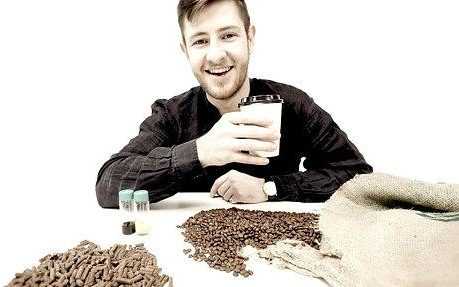Used coffee grounds have been turned into a cheap, renewable fuel that can be used in wood-burning stoves, according to a young entrepreneur who claims his invention will cost half the price of coal, wood or charcoal.
Bio-bean, which was founded three years ago by architecture student Arthur Kay (PICTURE), collects coffee slops from a network of coffee shops, retailers, airports and coffee factories, and turns them into biofuel.
The grounds are stripped of oil and packed together to form small bricks, which do not release an aroma when burnt, despite being made from used coffee.
How can coffee power buildings?Play! 02:49
“We’ve removed the oil, which means there is no smell,” said Mr Kay. “Some people think this is a shame but others don’t want their home to smell like Starbucks.”
To date, the business has done deals with big business customers but it is now launching its first consumer product. “No one has an emotional attachment to their fuel at the moment but we’re trying to create that with Bio-bean,” said Mr Kay.
“The main selling point will be cost but we’re also coming up with fun campaigns, like recipes for coffee-roasted vegetables and coffee BBQ burgers, to build that relationship.”
Bio-bean is launching its new briquettes through a pre-order campaign on Crowdfunder next month. The first bags will arrive with customers by the summer, Mr Kay said.
“We are hoping to generate sales of £50,000 through pre-orders, as it’s the first year and we don’t want to push too hard,” Mr Kay said.
The coffee briquettes are a better fuel source than wood
The coffee briquettes are a better fuel source than wood
Bio-bean has funded the development of the coffee briquettes from cash in the business.
It has contracts with a number of big coffee companies and waste management firms to pick up their old coffee grounds, turn them into fuel, and sell them back to the company at a price that represents a significant saving on wood or fossil fuel alternatives.
Previously, these companies were paying £64 a tonne for the waste to be dumped in landfill, with transport costs taking the total per tonne to £154.
“We recycle the coffee into these highly calorific fuel pellets,” said Mr Kay. “We’ve saved our customers a lot of money.”
The calorie content of fuel is determined by how densely the energy is packed into the product. Bio-bean’s pellets are more calorific than wood and only slightly less caloric than coal.
The company has been praised for its “great innovation” by trade body, the Renewable Energy Association, for finding a way to use commercial waste for fuel.
“It is crucial to keep innovating in the UK renewables market, and to keep finding new solutions to problems we face as a society, such as rethinking what we do with waste,” said James Court, the REA’s head of policy and external affairs.
“Trying to decarbonise the heat sector is challenging and the UK is struggling to achieve targets. There is not a single, one size fits all solution to this and it clear that we need different solutions for different heat customers.”
Coffee chains such as Costa have partnered with Bio-bean
Coffee chains such as Costa have partnered with Bio-bean
Bio-bean has the capacity to make 50,000 tonnes of biomass at its Cambridge factory each year – that’s using grains from one in 10 of the cups of coffee drunk in the UK.
Mr Kay has spent “many millions” on developing the technology: “Building factories and dealing with chemicals, waste and energy are very expensive,” Mr Kay said.
This cash has come from winning several awards and competitions. Most recently, the company won €500,000 (£400,000) from the Green Challenge competition, which is funded by the Dutch Postcode Lottery.
Bio-bean has also “topped up” its cash reserves with angel investment and venture capital.
Mr Kay has big ambitions for the company. “I’m currently in Spain looking at a factory near Barcelona and next week I’m in Germany,” he said. “We can apply our technology and business model to any coffee-drinking nation.”
Bio-Bean has previously stated a forecast turnover of £7.5m this year but the success of the new briquette business could drive up revenues even further.
















